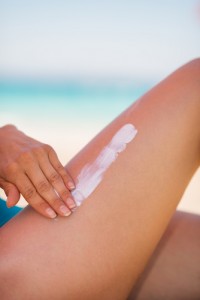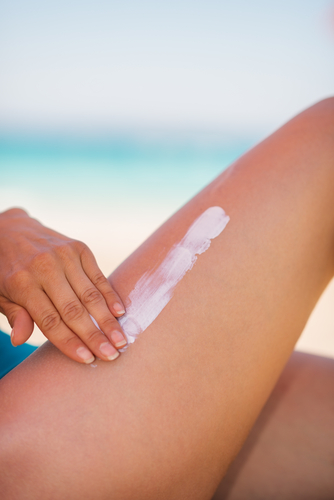 Even with sun protector factor (SPF) 50, sunscreen is only partially effective against the immediate radiation damage of the sun, and does not offer complete protection against melanoma, one of the most dangerous forms of skin cancer that kills an estimated 8,790 people in the U.S. every year. These are the findings of a study conducted on mice by researchers at the Neurosciences Institute, Joint Center of the University Miguel Hernández.
Even with sun protector factor (SPF) 50, sunscreen is only partially effective against the immediate radiation damage of the sun, and does not offer complete protection against melanoma, one of the most dangerous forms of skin cancer that kills an estimated 8,790 people in the U.S. every year. These are the findings of a study conducted on mice by researchers at the Neurosciences Institute, Joint Center of the University Miguel Hernández.
The study, published in the journal Nature, was motivated by the fact that although cutaneous melanoma is epidemiologically linked to ultraviolet radiation, the molecular mechanisms by which this radiation drives melanomagenesis remain unclear.
To investigate how ultraviolet radiation accelerates oncogenic BRAF-driven melanoma genesis (BRAF is a human gene that makes a protein called B-Raf, in which occurs the most common somatic mutation in melanoma), the team of researchers used genetically-modified mice that were susceptible to melanoma.
They noted that in mice expressing BRAF in their melanocytes, a single dose of ultraviolet radiation that would cause a mild sunburn in humans induced clonal expansion of the melanocytes, and repeated doses of ultraviolet radiation increased the melanoma burden. Researchers then found that ultraviolet light triggers mutations in the DNA of melanocytes in a particular gene called Trp53, known as the protector of the genome, as it plays a key role in identifying and repairing damage produced by UV light in cells.
As a result, the team showed that sunscreen, even with SPF 50, delayed the onset of ultraviolet radiation-driven melanoma, but only provided partial protection. Furthermore, the ultraviolet radiation-exposed tumors showed increased numbers of single nucleotide variants, and researchers observed mutations in the Trp53 tumor suppressor in approximately 40% of cases. This means that sunscreen can lower DNA damage and delay the development of the skin cancer, but can’t protect the Trp53 gene agains the harm caused by ultraviolet radiation.
Even so, researchers concluded, this study validates public health campaigns that promote sunscreen protection for individuals at risk of melanoma.
In addition to using sunscreen to protect skin, Professor Richard Marais, study author and Cancer Research UK scientist, highlights the importance wearing hats and loose-fitting clothing, as well as seeking shade during the strongest hours of sun light.


